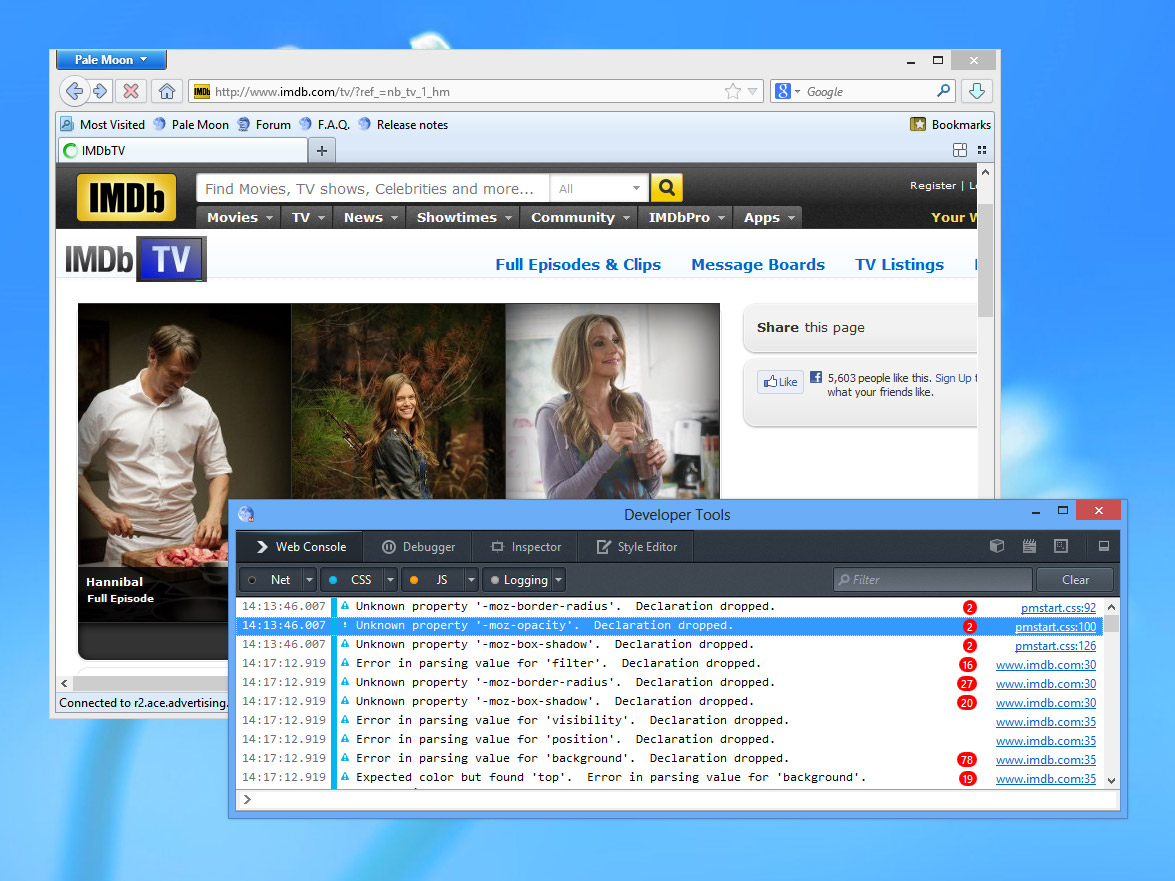
Mozilla takes on spyware maker
The Mozilla Foundation is accusing Gamma International, a UK-based software group, of making a false association between one of its products and the Firefox name.
Gamma International produces FinFisher, a program used by governments to obtain data in a covert way. FinFisher is often installed by disguising itself as an update to a well known program such as Firefox. Mozilla has now sent a cease and desist letter to Gamma claiming that its Firefox trademark is being violated and that the practice must end immediately.

Google preps 'packaged apps' for Chrome stable channel
I/O starts two weeks from today, and Google wastes no time whetting developer interests. Yesterday, the search and information giant revealed new Google+ Sign-In benefits. Today there are changes regarding "packaged apps". Surely the big stuff will wait for the keynote, which takes place on a single day this year, but expect more like last two days beforehand.
"Starting today Chrome packaged apps will be available in the Chrome Web Store for anyone on Chrome's developer channel on Windows and Chrome OS", Amanda Bishop, Google product manager, says. "You will notice that the App category now contains only the new Chrome packaged apps. A new category, called Websites, contains all existing hosted apps and legacy packaged apps". She tempts me to change Chrome channels, but I'll wait. And you?

The way we were -- CERN recreates the first website
You might think that complex experiments involving particle accelerators would be enough to keep the people at CERN (the European Organization for Nuclear Research) occupied. But of course in between all that nuclear stuff a CERN team led by Sir Tim Berners-Lee found time to create the first ever website.
This must have been a somewhat frustrating experience back in 1993 when hardly anyone had access to a browser -- rather like Bell inventing the telephone and not having anyone he could call. Now as we reach the 20th anniversary of the landmark event that gave birth to the Web, CERN has started a project to restore that first website.

Submit your questions for the Internet Explorer team
Usually when I do a Q&A session with tech firms like IBM, The Raspberry Pi Foundation, and Vonage, I come up with the questions myself, picking topics I think will be of most interest to our readers. However, for my forthcoming interview with the Internet Explorer team I want to shake things up a bit.
So instead of compiling the list of questions myself, I’d like your help and input. If you've a burning question you'd like the IE team to answer, post it in the comments below.

Google welcomes Office to Chrome
Irony can strike in the strangest of places. Just this morning I was discussing Office with my colleague Joe Wilcox, who pointed out an article he had written back in 2010 titled "Microsoft Office is obsolete, or soon will be". I argue the opposite, telling him that students and businesses are nowhere close to abandoning the Microsoft suite.
While I doubt Google is caving to my point of view, the company perhaps helps support it today. Jelte Liebrand, a Google Software Engineer, announces that "if you’re running Chrome Beta on Windows or Mac and install the Chrome Office Viewer (Beta) extension, you’ll be able to click a link to an Office file and open it directly in Chrome".

‘Child of the 90s’ ad watched 28 million times, but has it changed people’s views on Internet Explorer?
Microsoft gets a lot of press coverage for its Scroogled campaign, but little of it positive. Fortunately, the software giant has other advertising strategies that people do like, one of the better ones being The Browser You Love to Hate for Internet Explorer 10.
As part of that campaign, Column Five, a creative agency in Newport Beach, California was tasked with coming up with an internet commercial and the result was a nostalgic romp through 1990s that hit 28 million views in just three months and earned it a Webby nomination (voting for that ends today).

Google Q1 2013 by the numbers: $13.97B revenue, $9.94 EPS
Google may be a company of many personalities -- browser and operating system developer, connected-device manufacturer, fiber-optic Internet servicer, search giant and social network, among many others. But the core business is still about one thing: Advertising, as calendar first quarter results, delivered today after the closing bell, show.
Revenue rose 31 percent to $$13.97 billion, year over year; operating income, excluding Traffic Acquisition Costs, was $3.48 billion, up from $3.39 billion. Net income climbed to 3.35 billion up from $2.89 billion. That's $9.94 earnings per share, including costs associated with discontinued operations.

Chrome co-ops rival browsers
Now here's a head-scratcher for your coffee break. Today, Google released a new tool that allows businesses to make Chrome their default while launching legacy browsers (e.g., Internet Explorer) for apps that need them. Strange thing: Chrome is outdated every 12 weeks.
As a marketing ploy to move IT organizations that have applications demanding some version of IE, Google exacts brilliance. But the Legacy Browser Support add-on defies one of the major reasons many businesses prefer Internet Explorer: Stable releases for long periods.

BitTorrent releases Surf browser plugin beta
The glory days of Torch, a Chrome-based web browser known for its built-in Torrent capabilities, may be short-lived because similar functionality is headed your way right in the web browser you are probably using right now. Surf, the plugin announced back in January, rolls into full beta release today.
The company announces that "BitTorrent Surf started out as a little Chrome experiment: a way to make BitTorrent simpler. Basically, Surf transforms your browser into a BitTorrent client; with discovery and downloading built in". The experiment apparently went well because the browser plugin hits beta mode for not only Chrome, but also Firefox as well.

Internet Explorer 'Catching Fire' with The Hunger Games
Later this year, November 22nd to be exact, part two of The Hunger Games, titled The Hunger Games: Catching Fire, will hit the big screen. Microsoft's Internet Explorer team has partnered with Lionsgate to set up a new IE-optimized website for the sequel to the blockbuster movie with the hope of not only getting you excited about the film but also about the "browser you loved to hate".
The Hunger Games Explorer launches on the heels of the MTV Movie Awards which premiered the trailer. Microsoft's Roger Capriotti says "with the global launch of The Hunger Games: Catching Fire trailer, fans can now visit The Hunger Games Explorer to be immersed in this world, track every development of The Hunger Games: Catching Fire, including tweets, exclusive images and videos, and then share their thoughts and excitement with others around the world creating a global conversation".

Pale Moon 20.0.1 tempts Firefox users
Moonchild Productions has released Pale Moon 20.0.1 and Pale Moon x64 20.0.1 for Windows. Also available in portable 32-bit and portable 64-bit forms, the Firefox variant had only just been updated to version 20.
Version 20.0.1 includes all the best bits of Firefox 20, including the new panel-based download manager, per-window private browsing support and ability to close individual non-responsive plug-ins to protect the current browser session.

Mozilla and Samsung team up to kill Chrome mobile
Say, Google, do you feel a sharp burning sensation in your back? That's the knife Samsung just plunged in. Ouch! The twisting motion must really hurt.
Mozilla and Samsung are collaborating on a new mobile web browsing engine, Servo, which success would offer huge benefits to both companies. Apple and Google dominate mobile devices with their respective WebKit browsers, largely shutting out Firefox from the most important device category since the PC. Incumbency is an advantage, with browsers preinstalled on Android and iOS. Users must download rival products, and many don't. Meanwhile the South Korean electronics giant accounted for nearly 43 percent of all Android smarthphone sales in fourth quarter, according to Gartner. The company controls the broader user experience via TouchWiz UI, but Google controls the browser.

Google Now for Chrome not now but very soon, latest browser build reveals
Back in March, which was not so long ago, we learned that the Android feature that is all the rage would likely come to Chrome the browser and operating system. François Beaufort uncovered code that seemed to confirm the coming inclusion of Google Now, as Beaufort seems to uncover everything -- to the point where the search ginat recently threw up its proverbial hands in frustration and finally hired the man.
That day has arrived...in a manner of speaking. The latest build of Chrome Canary, the developer channel version of the browser, has hit the streets and version 28 comes with the initial framework for Now integration.

Firefox 20 arrives -- adds new features and improvements
Mozilla has released Firefox 20 FINAL for Windows, Mac and Linux, and version 20 promises to be something of a landmark new release with a number of notable new features migrating across from the beta version.
The headline new feature has to be the long-awaited panel-based download manager, but Firefox 20 also debuts per-window Private Browsing, plus new developer features including an option to view Developer tools in a separate window to Firefox itself.

Google releases Chrome 26 -- get it NOW!
Google has released Chrome 26 FINAL for Windows, Mac and Linux. The latest release proffers three relatively minor new features, including improved spellchecking, plus 11 specific security fixes.
The most notable changes in Chrome 26 are improvements to the spell-checker tool. All supported dictionaries have been refreshed, while Korean, Tamil and Albanian support have all been added. Those using the Google Sync feature will be pleased to learn that any custom words added to the dictionary can now be synced to other devices along with other settings.
